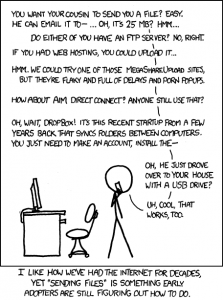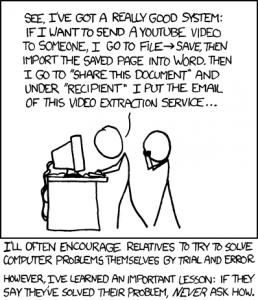I present once again, the List of Books I Read Last Year! 2015 was a banner year for me, as I managed to read 20 books! That’s double last year’s count. If you are wondering what my secret was, I just read much shorter books in 2015. I should have thought of that sooner. Almost everything I read on my now “old” Kindle Keyboard. It lasted another year.
Trout Fishing in America / The Pill vs. the Springhill Mine Disaster / In Watermelon Sugar
Richard Brautigan
This is an old hippy classic. I have to say, I didn’t care for “Trout Fishing” much. I liked a few of the poems in the middle section, but I found them uneven. But the Watermelon Sugar novella was just completely delightful – a unique, possibly post-apocalyptic, fantasy story. I can’t think of anything like it.
JavaScript: The Good Parts
Douglas Crockford
A dense technical book on what to use, and what to avoid in JS. I think I read through the Object chapter four times. I’m still blown away by his method for building private properties with closures.
David Foster Wallace’s Infinite Jest: A Reader’s Guide
Stephen J. Burn
Meh, I think this suffered from being written too soon. The Infinite Jest wiki is a lot better in many ways.
Goodbye to All That
Robert Graves
I enjoyed this WWI memoir, though I felt like he wrote about his time in combat with too much detachment.
The Trial
Franz Kafka
You know that dream you have where you are in your home, except everything is different and confusing, and there are things hidden behind doors that you didn’t know were there, and you have some strange imperative you must complete? The vicious bureaucracy – dream-like in its intricacy and absurdity in The Trial – have exactly that quality. This was one of the best books I read in 2015, and it’s a recommended read for absolutely everyone. This is the book that defines, Kafkaesque.
Reaper Man
Terry Pratchett
We lost Terry Pratchett last year, but thankfully he wrote many books, and this was another fun one.
Dive Into HTML5
Mark Pilgrim
We have been using HTML5 for years already, of course, but have you done your homework and really studied the whole thing? If not, this is available for free on the internets.
Iron Council
China Miéville
This was the third (and last) novel set in the rich, sinister, dark, dirty, straight-up filthy Bas-Lag. I can’t recommend this series enough. It’s “fantasy” I guess, but definately its own unique variety. It ain’t “swords and wizards” fantasy. This book hasn’t been as popular as the preceding two, and maybe I’d only give it 9/10, which is to say, I absolutely loved it, and loved going back to Bas-Lag.
Civil War Stories
Ambrose Bierce
Bierce is probably most famous now for his, “Devil’s Dictionary.” But this is a wonderful collection of fictional episodes from the Civil War, most with a “twist” ending. It’s a great book from beginning to end, but An Occurrence at Owl Creek Bridge was particularly striking.
Homage to Catalonia
George Orwell
This is Orwell’s memoir of his time fighting with the anarchists against the fascists during the Spanish Civil War. It adds so much depth to his politics and the loathing he developed for Soviet communism. It starts out as story of deprivation in WWI style trench warfare, but picks up steam as he finds himself in the city fighting the propaganda and treachery of his supposed allies.
The Sheltering Sky
Paul Bowles
This was beautifully written, but I had a hard time identifying with the main characters. It reminded me of Camus’ The Stranger: people in North Africa making terrible decisions.
The Big Sleep
Raymond Chandler
This was fun, and I was a little surprised by how closely the old Bogart movie stuck to the book. The notable difference was that Chandler’s vices, victims and villains were all a little dirtier. General Sternwood says, “A nice state of affairs when a man has to indulge his vices by proxy,” which is of course just what I’m doing reading a noir detective novel.
Things Fall Apart
Chinua Achebe
I enjoyed this story of the colonization and missionary conversion in East Africa from the point of view of an African tribesman.
1984
George Orwell
So the whole family (Bean, Annabel and I) read or re-read 1984 this year. It was very interesting to put this novel, which is so important to me, in context with Homage to Catalonia and Orwell’s experiences in the Spanish Civil War. And it’s cool that I now have the experience of this book in common with my daughter.
Blood Meridian, or the Evening Redness in the West
Cormac McCarthy
This western begins with the tightest, most tersely told history of a boy growing up to become an outlaw. Every step unfolds like math, so clearly coming out of the last. Every page contains a horror more shocking that the previous. It was an amazing read.
Brideshead Revisited
Evelyn Waugh
I mostly enjoyed the book, but the ending felt like a shabby advertisement for Catholicism. I felt pretty let down. Along with Goodbye to All that, this book surprised me a little with just how gay the English aristocracy of a century ago was.
The Lathe of Heaven
Ursula K Le Guin
I enjoyed this imaginative science fiction novel about dreams coming true in the worst possible ways, by one of my favorite authors.
Civil Disobedience
Henry David Thoreau
Every other sentence in this tract is another perfect poem about liberty. I felt like jumping up an down in agreement most of the time I was reading. It’s amazing to think that myself and all of the good an kind people I know, take a significant portion of their income, and give it to people so they can use it to murder an oppress other people. We pay money so the government will put utterly harmless people in cages for victimless “crimes”. We pay money to bomb brown people out in West Dirtistan with robot airplanes. We pay to have our phone calls and emails recorded. If I do not pay my taxes because supporting that bruises my concise too much, I’ll be just another “tax dodger” who’s trying to avoid doing his, “fair share”. Well Thoreau went to jail rather than support slavery and the Mexican-American war and wrote this book about why that was the right thing to do.
Sacred and Secular Elegies
George Barker
Ok, book porn here! So I was listening to the audio book of Hunter S Thompson’s Songs of the Doomed, and there’s an out-take of some chatter that’s a little hard to hear between stories where Thompson reads a few lines from the last stanza of Sacred Elegy #5, by George Barker. The poem is pretty amazing, so I tracked it down. It’s way out of print, but I found a copy retired from some high school library. When I punched it into goodreads.com, it had never been submitted before, so the picture of the book on goodreads is actually mine. You can see the library marks in the corner. The book itself is very short, but the poems are so dense and impressionistic, it actually took a while to get through it. And amusingly enough, I felt that the last poem, Sacred Elegy #5, was easily the best.
One Hundred Years of Solitude
Gabriel García Márquez
I just finished this before the new year, and enjoyed it tremendously. Keep a family tree handy for the family that this book of magical realism follows through seven generations. They keep naming one generation after the last, and it’s easy to get lost. Great book, in any case.


